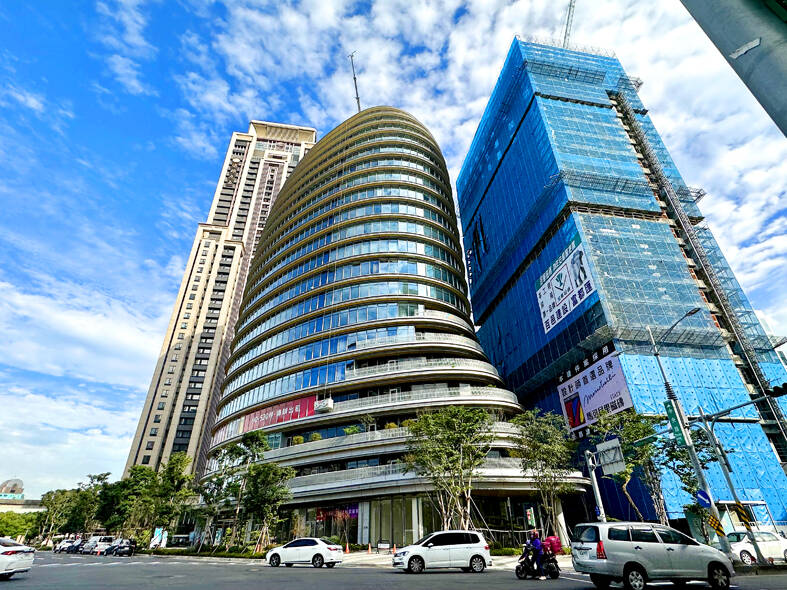Commercial property transactions in Taiwan increased 2.8 percent to NT$137 billion (US$4.46 billion) this year, mainly due to demand for offices and factories, but land deals tumbled 20.4 percent to a six-year low of NT128.4 billion due to unfavorable lending terms, Colliers International Taiwan (高力國際) said on Wednesday.
The property market would be stronger next year, as a monetary tightening cycle is likely over, giving firms more financial muscle to expand capacity and boost their real-estate holdings, the property broker said.
Self-occupancy demand for offices and factories contributed 53 percent of commercial property deals, or NT$73.2 billion, Colliers Taiwan senior research director Eilleen Liang (梁儀盈) told a news conference in Taipei, citing transaction data for the year to Monday.

Photo: Hsu Yi-ping, Taipei Times
A real-estate investment trust in June sold two office buildings in Taipei’s Songshan District (松山) for NT$2.98 billion and NT$2.45 billion, suggesting a premium of 1.1 percent and 5.3 percent respectively despite a sluggish economy, Liang said.
As for industrial property deals, a Hon Hai Precision Industry Co (鴻海精密) affiliate bought a factory complex in New Taipei City’s Tucheng District (土城) and Topco Scientific Co (崇越科技), a distributor of semiconductor materials, purchased an office building in Taipei’s Neihu District (內湖), Colliers Taiwan said.
Local insurers, normally the main commercial property players, failed to make the list of the top 10 deals this year, Colliers Taiwan managing director Andrew Liu (劉學龍) said, calling the situation rare.
Liu attributed the absence to a series of interest rate hikes that drove up the minimum yield requirement to 2.875 percent for real-estate investments by insurance companies.
Rising property prices make it difficult to pass the test in the first place, he added.
Land deals were weaker despite help from auctions of public plots of land in Taichung and Kaohsiung this quarter, Liu said.
“It was unusual to see no land deals in excess of NT$5 billion this year,” Liu said, adding that credit controls and other unfavorable measures were to blame.
Hung Yuan Development Co (宏園建設) and Ruicheng Construction Co (瑞誠建設) jointly bought a plot of land in Taipei’s Beitou District (北投) for NT$4.79 billion, making it the largest deal by value, Colliers Taiwan said.
Looking ahead, there is no reason not to be positive about the property market, Liu said.
The world is keen about the prospects for artificial intelligence, so Taiwanese firms in the supply chain would benefit and need more office space, Colliers Taiwan said.
Local insurers and developers also would boost their holdings once the US Federal Reserve lowers interest rates, it said, adding that inflation pressure appears to have been brought under control.

Intel Corp chief executive officer Lip-Bu Tan (陳立武) is expected to meet with Taiwanese suppliers next month in conjunction with the opening of the Computex Taipei trade show, supply chain sources said on Monday. The visit, the first for Tan to Taiwan since assuming his new post last month, would be aimed at enhancing Intel’s ties with suppliers in Taiwan as he attempts to help turn around the struggling US chipmaker, the sources said. Tan is to hold a banquet to celebrate Intel’s 40-year presence in Taiwan before Computex opens on May 20 and invite dozens of Taiwanese suppliers to exchange views

Application-specific integrated circuit designer Faraday Technology Corp (智原) yesterday said that although revenue this quarter would decline 30 percent from last quarter, it retained its full-year forecast of revenue growth of 100 percent. The company attributed the quarterly drop to a slowdown in customers’ production of chips using Faraday’s advanced packaging technology. The company is still confident about its revenue growth this year, given its strong “design-win” — or the projects it won to help customers design their chips, Faraday president Steve Wang (王國雍) told an online earnings conference. “The design-win this year is better than we expected. We believe we will win

Chizuko Kimura has become the first female sushi chef in the world to win a Michelin star, fulfilling a promise she made to her dying husband to continue his legacy. The 54-year-old Japanese chef regained the Michelin star her late husband, Shunei Kimura, won three years ago for their Sushi Shunei restaurant in Paris. For Shunei Kimura, the star was a dream come true. However, the joy was short-lived. He died from cancer just three months later in June 2022. He was 65. The following year, the restaurant in the heart of Montmartre lost its star rating. Chizuko Kimura insisted that the new star is still down

While China’s leaders use their economic and political might to fight US President Donald Trump’s trade war “to the end,” its army of social media soldiers are embarking on a more humorous campaign online. Trump’s tariff blitz has seen Washington and Beijing impose eye-watering duties on imports from the other, fanning a standoff between the economic superpowers that has sparked global recession fears and sent markets into a tailspin. Trump says his policy is a response to years of being “ripped off” by other countries and aims to bring manufacturing to the US, forcing companies to employ US workers. However, China’s online warriors